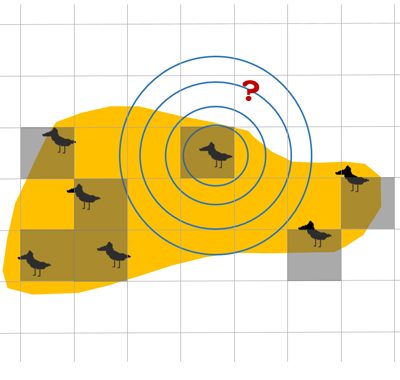

COURSE OVERVIEW
Species distribution data are always incomplete snapshots of actual species distributions, which are dynamic and thus constantly changing. Predicting species distributions and how they may evolve is crucial for ecosystem management and conservation planning, but the intrinsic unpredictability that is inherent to living organisms prevents accurate categorical forecasts of species’ occurrence sites, or accurate delimitations of their distribution ranges.
In this course we will analyse the limitations and uncertainties associated with species distribution records, and provide methods for dealing with them, including species distribution models treated with fuzzy logic and quantum mechanical concepts.
The course will include theoretical and practical lessons. We will use particular R packages, such as fuzzySim and modEvA, for 1) modelling species distributions based on available occurrence records; 2) evaluating the predictive capacity of these models using a varied set of measures that address different facets of model performance, such as discrimination, classification, explanatory power and calibration; and 3) incorporating natural uncertainty in analyses of species distributions, namely using fuzzy logic and formulas from quantum mechanics to assess similarity, diversity and change in biogeographical communities.
We will provide sample data for most of the course, but students will also have a chance to apply what they have learned to their own data if they wish.
REQUIREMENTS
All participants must have a personal laptop with R installed, webcam if possible, and a good internet connection. Basic knowledge of R is required.
CONTACT
LOCATION
This course will be delivered online.
Please check the schedule for the live online part, and be aware that it is UTC+1 (Madrid time zone).
DATE
October 12th-16th, 2020
LANGUAGE
English
COURSE LENGTH & ECTS
28 hours online.
This course is equivalent to 1 ECTS(European Credit Transfer System) at the Life Science Zurich Graduate School.
The recognition of ECTS by other institutions depends on each university or school.
PLACES
Places are limited to 16 participants and will be occupied by strict registration order.
Participants who have completed the course will receive a certificate at the end of it.
PROGRAM
Program
- Introduction to species distributions.
- Types of distribution data: Presence-only, presence-absence, range maps.
- Facing uncertainty in species distributions.
- Introduction to modelling species distributions.
- Presence-only, presence-background and presence-absence modelling methods.
- Overview of R packages for modelling species distributions.
- fuzzySim introductory practice: Obtaining distance-based fuzzy distribution data.
- Species distribution modelling with the favourability function.
- fuzzySim modelling.
- Calculating “quantum” measures of diversity and distributional change.
- Evaluating the fit and predictive capacity of distribution models.
- modEvA practice: Analysing and evaluating fuzzy distribution data.





